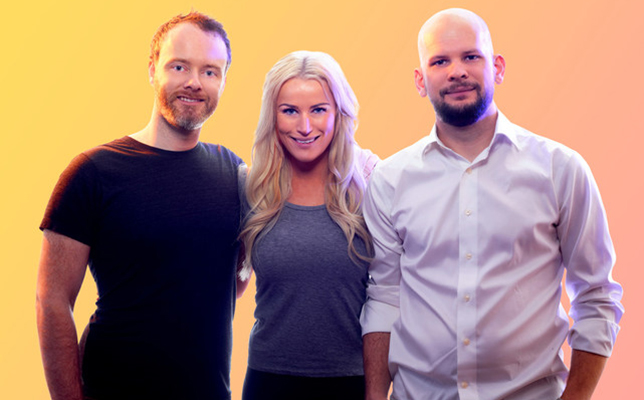Code
World's First Fully Interactive Coding Studio for Kids to Launch in Chicago

Codeverse founders, from left: Craig Ulliott, Katy Lynch and Dave Arel.
A trio of tech entrepreneurs have launched Codeverse, the world’s first “hackable” classroom and vertically integrated technology platform designed to teach children ages 6 to 12 the skill of coding.
The Chicago-based company’s kid-friendly programming language, KidScript, and flagship state-of-the-art coding studio aim to bring technology to life, giving children a 3,600-square-foot, interactive and collaborative space that’s designed to inspire creativity while teaching them how to code projects, games and apps. The opening for the studio is scheduled for July.
Codeverse is the brainchild of husband and wife duo Craig Ulliott and Katy Lynch. The pair met at Where I’ve Been, Ulliott’s first company, which was acquired by TripAdvisor in 2011 with 10 million users. Ulliott and Lynch then joined forces to build the popular digital media firm, SocialKaty, which was acquired by Manifest Digital in 2014. Ulliott also co-founded loyalty company Belly, and Lynch served as CEO of Techweek.
The couple tapped close friend Dave Arel to join as a third partner.
Codeverse’s mission to teach a billion children to code is already underway. The company has raised significant capital from local and national investors, according to a news release, and has plans to launch three more Codeverse studios in Chicago over the next 18 months. Additionally, Codeverse aims to open studios in every major American metropolitan area within the next five years before expanding internationally.
“Learning to code at a young age is an absolute necessity for all kids,” Lynch said in the release. “Coding today is so much more than computer science; it’s a way of thinking that promotes intellectual curiosity, problem solving and creative expression. These are the real skills kids need for their futures.”
According to the U.S. Bureau of Labor Statistics, there will be more than 1 million unfilled tech jobs within the next three years. “Technology has already changed every industry and left many people behind,” Arel said in a statement. “Too many of our children are not adequately prepared for tomorrow’s jobs. We created Codeverse to fix this.”
Developed in secret for more than a year, the first Codeverse studio and technology platform launches in Lincoln Park, Chicago this July. When a student enters the studio, an iPad lights up with his or her name. Kids use their iPads to navigate the space and write with the company’s proprietary coding language, KidScript, which enables them to build games and apps as well as hack hundreds of objects ranging from lasers and 3D printers to robotic arms and fog machines. The million-dollar facility is also full of collaborative and social elements, such as a 20-foot screen where 10 children can collaborate on coding challenges at a time.
“As kids use the platform, the curriculum adapts to their skills and learning style,” Ulliott said in a statement. “The underlying data of the program also allows us to constantly refine the product. The studios double as the ultimate product testing ground.”
Built from the ground up purely to teach children to code, KidScript is Codeverse’s original, kid-friendly coding language. Using KidScript, children can learn the craft of code while bringing their own ideas to life through a simplified programming language. This innovation allows children to see results as they type, providing a much greater understanding of cause and effect. Unlike traditional coding, feedback is given in real time, which enables children to correct errors on the spot, creating an active learning environment.
Codeverse membership starts at $125 a month and gives children recurring use of the studio space, as well as access to the coding platform from home. The platform and curriculum is designed for children between the ages of 6 and 12.
For more information on Codeverse, visit the company’s website.
About the Author
Richard Chang is associate editor of THE Journal. He can be reached at [email protected].